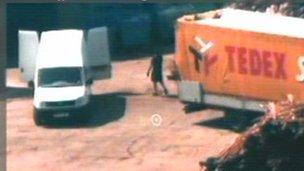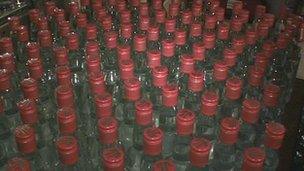Leicestershire gang's fake vodka spread throughout UK
- Published

The HMRC raid in September 2009 followed a five-month surveillance operation
Tens of thousands of bottles of dangerous fake vodka ended up in shops across the UK following a "sophisticated" counterfeit operation in Leicestershire.
As the men behind the secret production line begin prison sentences, customs officers said they feared much of their illicit produce remained on sale.
The raid, which uncovered their rural factory, found enough industrial alcohol to make 100,000 bottles of fake vodka.
But it is thought a further 165,000 bottles had already been distributed across the UK.
HM Revenue and Customs (HMRC) discovered the scale of the operation when it raided the factory, at a rented farm near Melton Mowbray, in September 2009.
Professional labels
The gang's leader, Kevin Eddishaw, had organised a production line which started with methylated spirits imported from Poland.
This would then be treated and diluted by Polish chemist Wojciech Jan Herbst and relabelled as bottles of Glens Vodka, ready to be sent out.
Investigators subsequently found bottles manufactured by the gang in independent off-licences in London, Salford and Merthyr Tydfil.
The bottles of vodka seized featured professionally printed labels, duty stamps and bottle tops - all of which were counterfeit.
Analysis of a sample bottle showed raised levels of methanol which can pose health risks, including the risk of blindness, if consumed in high quantities.
Simon De Kayne, assistant director of criminal investigation for HMRC, said the gang had scant regard for any risk their vodka posed.

Bottles produced by the gang were found in off-licences around the UK
Unfit for humans
He said: "The gang were fully aware the counterfeit vodka they manufactured contained highly dangerous chemicals making it unfit for human consumption, but were interested only in making a profit at the expense of British taxpayers."
Each gang member had a specific role in the operation. John Humphreys was Eddishaw's right-hand man and Mark Gyles was the driver who transported the goods.
James Fyfe was the site foreman of Moscow Farm, which housed the group's factory and Michael Matthews was a printer who procured supplies of counterfeit labels and boxes.
The gang also employed migrant workers to keep the production line running - each of them put at risk by a work environment with a lack of health and safety provision.
The court heard there were no fire safety measures in the factory and the alcohol vapours alone could have triggered a major explosion if the lights had been switched on or a naked flame or cigarette had been lit.
Earlier this year an explosion at an illegal distillery in Boston in Lincolnshire left five men dead and another seriously injured.
Something similar could have quite easily taken place in Leicestershire.
- Published25 November 2011
- Published3 November 2011
- Published2 August 2011